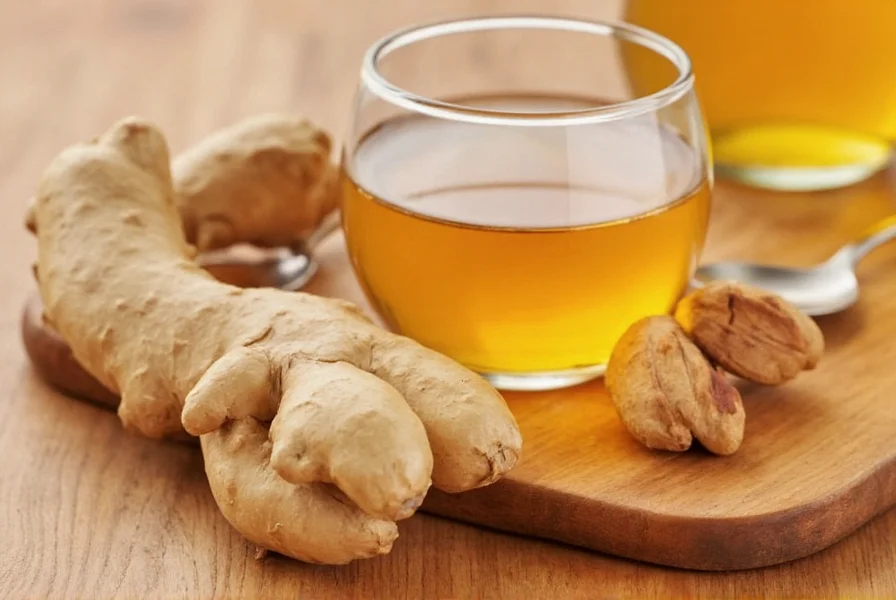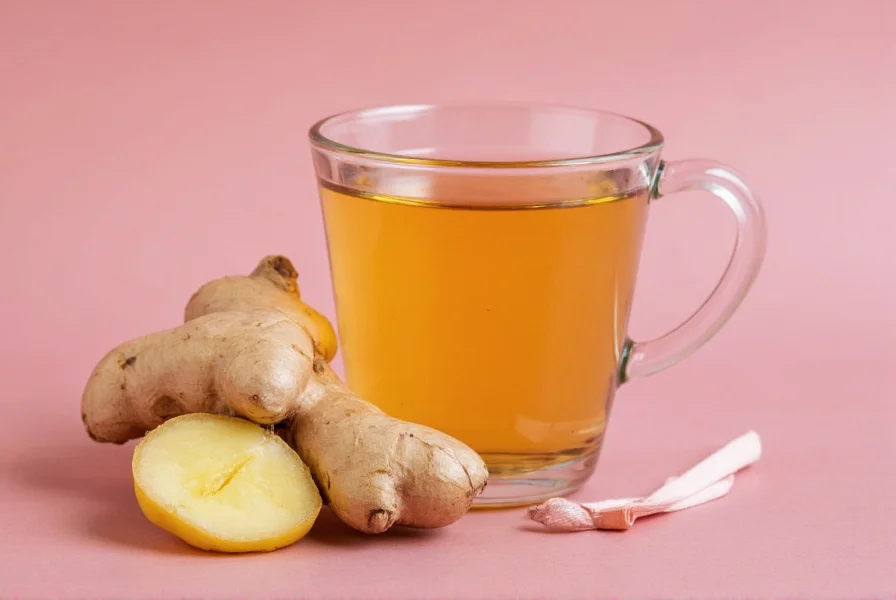Menstrual discomfort affects millions of women worldwide, with primary dysmenorrhea (painful periods without underlying pathology) being one of the most common gynecological complaints. Many seek natural alternatives to pharmaceutical pain relief, and ginger tea has emerged as a promising option supported by scientific research.
What Science Says About Ginger and Menstrual Pain
Multiple clinical trials have investigated ginger's effectiveness for menstrual pain relief. A comprehensive 2015 review published in the Journal of Alternative and Complementary Medicine analyzed six randomized controlled trials involving 666 participants. The analysis concluded that ginger significantly reduced menstrual pain intensity compared to placebo, with effects comparable to non-steroidal anti-inflammatory drugs (NSAIDs) like ibuprofen in some studies.
The active compounds in ginger—primarily gingerols and shogaols—work through multiple mechanisms:
- Inhibiting prostaglandin synthesis, which causes uterine contractions
- Reducing inflammation markers associated with menstrual pain
- Exhibiting analgesic (pain-relieving) properties
- Potentially regulating calcium channels involved in muscle contraction

Effective Ginger Tea Preparation for Period Relief
For maximum benefit during menstruation, proper preparation matters. Research indicates that the therapeutic effects require sufficient concentration of active compounds:
| Preparation Method | Recommended Amount | Steeping Time | Frequency |
|---|---|---|---|
| Fresh ginger tea | 1-2 tsp freshly grated ginger | 10-15 minutes | 3-4 times daily |
| Dried ginger powder | 250-500mg | 5-7 minutes | 3-4 times daily |
| Commercial ginger tea bags | 1-2 bags | As package directs | 3-4 times daily |
Begin consumption 1-3 days before your expected period start date and continue through the first few days of menstruation when cramps are typically most severe. Using freshly grated ginger generally provides higher concentrations of active compounds than pre-packaged tea bags.
Documented Benefits of Ginger Tea During Menstruation
Clinical evidence supports several specific benefits of ginger tea for menstrual discomfort:
Pain Reduction
A 2019 study in Pain Management Nursing found that women who consumed ginger tea experienced a 30-50% reduction in pain intensity compared to placebo groups. The pain relief typically began within 30-60 minutes of consumption and lasted several hours.
Nausea and Vomiting Relief
Ginger's well-documented antiemetic properties can help with menstrual-related nausea. A 2020 review in Complementary Therapies in Medicine confirmed ginger's effectiveness for reducing nausea symptoms during menstruation.
Inflammation Reduction
Ginger inhibits cyclooxygenase (COX) enzymes similar to NSAIDs, but through different pathways, reducing inflammation that contributes to menstrual pain without the gastrointestinal side effects common with pharmaceutical options.
Limitations and When Ginger Tea May Not Work
While promising, ginger tea isn't a universal solution for all menstrual issues:
- Secondary dysmenorrhea: If pain stems from conditions like endometriosis or fibroids, ginger may provide limited relief
- Severe pain: For debilitating menstrual pain, consult a healthcare provider as ginger alone may be insufficient
- Individual variation: Some women report minimal effects, possibly due to genetic differences in metabolizing ginger compounds
- Timing matters: Starting ginger tea after severe cramps have developed may reduce its effectiveness
Safety Considerations and Potential Side Effects
Ginger tea is generally safe for most women during menstruation, but consider these points:
- Bleeding concerns: While theoretical concerns exist about ginger's potential blood-thinning effects, research shows no significant increase in menstrual flow at typical doses
- Digestive effects: High doses may cause heartburn or stomach upset in sensitive individuals
- Medication interactions: Consult your doctor if taking blood thinners or diabetes medications
- Pregnancy: Avoid therapeutic doses if pregnant or trying to conceive without medical guidance

Ginger Tea Compared to Other Period Remedies
When considering natural period relief options, ginger tea holds several advantages:
- Versus NSAIDs: Fewer gastrointestinal side effects, though may be slightly less potent for severe pain
- Versus heat therapy: Can be used simultaneously with heating pads for enhanced relief
- Versus other herbal teas: More robust clinical evidence than many alternatives like chamomile or raspberry leaf
- Versus magnesium: Works through different mechanisms, making them potentially complementary approaches
When to Consult a Healthcare Provider
While ginger tea can be a helpful addition to your period management routine, seek medical advice if:
- Your menstrual pain suddenly becomes severe or disrupts daily activities
- You experience bleeding between periods or after menopause
- Period pain doesn't improve after 3-4 menstrual cycles of consistent ginger use
- You have a bleeding disorder or take anticoagulant medications
- You're trying to conceive and experiencing painful periods
Practical Tips for Maximum Benefit
To optimize your ginger tea experience during menstruation:
- Add lemon to enhance absorption of ginger's active compounds
- Include a small amount of healthy fat (like coconut milk) to improve bioavailability
- Combine with light exercise like walking for enhanced pain relief
- Stay consistent with timing—don't wait until pain becomes severe to start
- Track your symptoms to determine your personal effective dosage
Conclusion
Ginger tea represents one of the better-researched natural options for menstrual pain relief. Clinical evidence supports its effectiveness in reducing period cramp severity for many women, with minimal side effects when used appropriately. While not a cure-all, incorporating properly prepared ginger tea into your premenstrual and menstrual routine may significantly improve comfort for primary dysmenorrhea. As with any natural remedy, manage expectations, use it consistently, and consult healthcare professionals for persistent or severe menstrual issues.
Frequently Asked Questions
Does ginger tea really help with period cramps?
Yes, multiple clinical studies show ginger tea can reduce menstrual pain intensity. Research indicates that consuming 250-500mg of ginger 3-4 times daily, starting 1-3 days before menstruation, significantly decreases period pain compared to placebo. The pain relief typically begins within 30-60 minutes of consumption and can reduce pain intensity by 30-50% for many women.
How much ginger tea should I drink during my period?
For menstrual pain relief, research suggests consuming the equivalent of 250-500mg of ginger 3-4 times daily. This translates to 1-2 teaspoons of freshly grated ginger per cup, steeped for 10-15 minutes. Begin consumption 1-3 days before your expected period start date and continue through the first few days of menstruation when cramps are typically most severe.
Can ginger tea increase menstrual flow?
Current research shows no significant evidence that ginger tea increases menstrual flow at typical therapeutic doses. While ginger has mild blood-thinning properties, studies specifically examining menstrual flow in women consuming ginger for period pain relief have not reported increased bleeding. However, if you have heavy menstrual bleeding or a bleeding disorder, consult your healthcare provider before using ginger therapeutically.
How does ginger tea compare to ibuprofen for period pain?
Research suggests ginger tea can be nearly as effective as ibuprofen for mild to moderate menstrual pain, with some studies showing comparable pain reduction. The key difference is that ginger works through multiple pathways (anti-inflammatory, prostaglandin inhibition) without the gastrointestinal side effects commonly associated with NSAIDs like ibuprofen. However, for severe menstrual pain, pharmaceutical options may provide stronger relief.
When should I start drinking ginger tea for my period?
For best results, start drinking ginger tea 1-3 days before your expected period begins and continue through the first few days of menstruation. This timing allows the active compounds to build up in your system before severe cramps develop. Consistent consumption is key—don't wait until pain becomes severe to start, as ginger works best as a preventive measure for menstrual discomfort.











 浙公网安备
33010002000092号
浙公网安备
33010002000092号 浙B2-20120091-4
浙B2-20120091-4